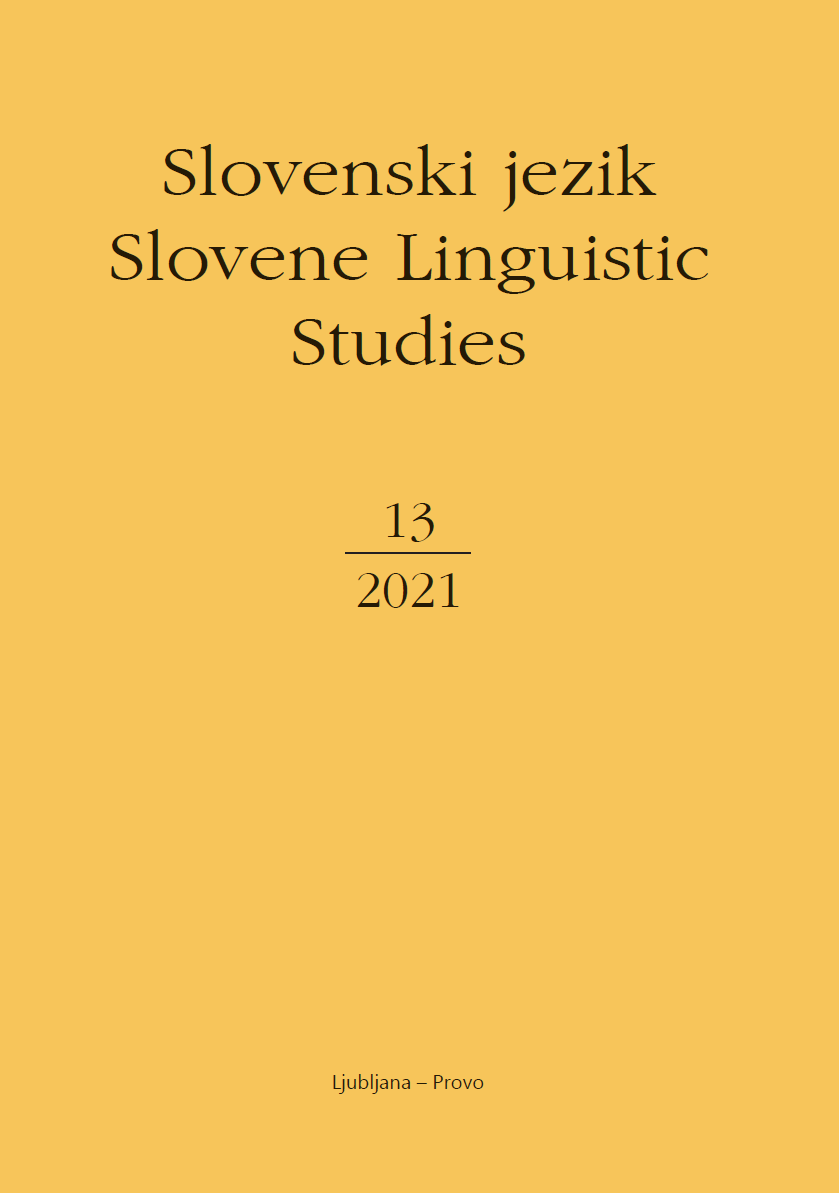Semantic and distributional features of Slovene koli-pronouns
DOI:
https://doi.org/10.3986/sjsls.13.1.04Keywords:
negative polarity items, free choice items, semantic scope, alternatives, indefinitenessAbstract
The paper outlines the core semantic and distributional characteristics of the Slovene koli-pronouns. The analysis of a sample from the reference corpus Gigafida 2.0 shows that koli-pronouns are both negative polarity items (NPIs) and free choice items (FCIs). In the scope of downward entailing operators, koli-pronouns adopt characteristics of NPIs and existential quantifiers. In non-downward-entailing environments, these pronouns behave as FCIs. If they outscope modal operators, they adopt features of universal quantifiers, creating the free choice effect. In the scope of modal operators or in non-modal contexts, they adopt features of existential quantifiers, highlighting the fact that the speaker is either oblivious or indifferent to the identity of the referent. Koli-pronouns can also introduce free relative clauses that function as definite descriptions of sets of individuals or situations. The usage of free relative clauses with an introductory koli-pronoun requires contexts that allow for the existence of at least two potential referents matching the description in the relative clause.
Downloads
References
Bajec, Anton, Kolarič, Rudolf, Rupel, Mirko, Šolar, Jakob. 1973. Slovenska slovnica. Ljub- ljana: DZS.
Breznik, Anton. 1934. Slovenska slovnica za srednje šole. Celovec: Družba sv. Mohorja. Cazinkić, Robert. 2000. Oziralni prilastkovi odvisniki. Jezik in slovstvo 46/1–2: 29–40.
Chierchia, Gennaro. 2013. Logic in Grammar: Polarity, Free Choice, and Intervention. Oxford: OUP.
Dayal, Veneeta. 1997. Free Relatives and »Ever«: Identity and Free Choice Readings. V: A. Lawson (ur.). Proceedings of SALT 7. Ithaca, NY: Cornell University. 99–116.
Đukanović, Maja. 2007. Termin nedoločni zaimki v slovenščini in srbščini. V: I. Orel (ur.). Razvoj slovenskega strokovnega jezika. Obdobja 24. Ljubljana: Center za slovenščino kot drugi in tuji jezik. 445–456.
Gabrovšek, Dejan, Žele, Andreja. 2019. Tipologija stavčnočlenskih odvisnikov v slovenščini. Slavistična revija 67/3: 487–507.
Gabrovšek, Dejan. 2019. Tipologija nestavčnočlenskih nematičnih dopolnil v slovenščini. Jezikoslovni zapiski 25/2: 83–86. DOI: https://doi.org/10.3986/JZ.25.2.5
Giannakidou, Anastasia. 1998. Polarity Sensitivity as (Non)Veridical Dependency. Amsterdam: John Benjamins.
Gregorčič, Kristina. 2018. Affective polarity items in Slovene. Magistrska naloga. Ljubljana.
Heim, Irene. 1990. E-Type Pronouns and Donkey Anaphora. Linguistics and Philosophy 13/2: 137–177.
Horn, Laurence R. 2005. Airport ‘86 Revisited: Toward a unified indefinite any. V: G. N. Carlson, F. J. Pelletier (ur.). Reference and Quantification: The Partee Effect. Stanford: CSLI Publications. 179–205.
Huddleston, Rodney D., Pullum, Geoffrey K. 2008. The Cambridge Grammar of the English Language. Cambridge, NY: CUP.
Ilc, Gašper. 2019. Aspects of Negation in English and Slovenian. Ljubljana: Znanstvena založba FF.
Janežič, Anton. 1863. Slovenska slovnica za domačo in šolsko rabo. Celovec: [Janez Leon].
Kadmon, Nirit, Landman, Fred. 1993. Any. Linguistics and Philosophy 16/4: 353–422. Ladusaw, William A. 1980. Polarity Sensitivity as Inherent Scope Relations. New York: Garland Publications.
Quirk, Randolph, Greenbaum, Sidney, Leech, Geoffrey, Svartvik, Jan. 1994. A
Comprehensive Grammar of the English Language. New York: Longman.
Toporišič, Jože. 2000. Slovenska slovnica. Maribor: Obzorja.
Downloads
Published
Versions
- 2023-03-27 (2)
- 2021-10-13 (1)
How to Cite
Issue
Section
License

This work is licensed under a Creative Commons Attribution-NonCommercial-NoDerivatives 4.0 International License.
Authors guarantee that the work is their own original creation and does not infringe any statutory or common-law copyright or any proprietary right of any third party. In case of claims by third parties, authors commit their self to defend the interests of the publisher, and shall cover any potential costs.
More in: Submission chapter





